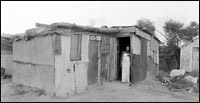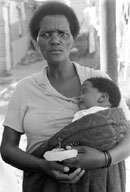
Changing Faces
By Cassandra Herrman
GUGULETU, South Africa — You could live a lifetime in Cape Town, South Africa and never go to Guguletu township. Though only 12 miles from the city center, most white South Africans only see Guguletu from the safety of a car, makeshift wood and cardboard roofs rising from the squatter camps that line the highways leading to Cape Town's beaches.
Many people talk of the "changing face" of black South Africa but what I saw on a Saturday afternoon in Guguletu was the faces of men and women whose lives have changed very little since apartheid ended.
|
A woman in Guguletu township outside of Cape Town. Photo by Mimi Chakarova. |
At a local bar I met a 28-year-old man named Khumbuzile who lost his job as an operator in a paper factory 8 years ago. "I have 3 children and a woman," he said. "What am I to do? I'm a human being. I've got too much pain." I asked him about the "new" South Africa and he said "It hasn't changed at all. We're suffering."
Walking through Guguletu with photographer Mimi Chakarova and two off-duty police officers, what struck me most were the stories of women. Women who don't always have access to running water and electricity and whose entire families often live in single room. Women who the police officers told me are assaulted because men in Guguletu haven't worked in years. Drinking has become a way to pass time in a township where half the adults are unemployed, and it usually leads to violence.
South Africa has the highest incidence of rape in the world, with one committed every 23 seconds.
I met a group of little girls gathered for a beauty contest and watched young women singing and dancing in a youth group choir, knowing that one in three of them will be raped or sexually abused by the time they are 18.
|
A mother and child in Guguletu township outside of Cape Town. Photo by Mimi Chakarova. |
One woman talked about the children in Guguletu, about them being killed because there were no speed bumps in front of the local school. "Our children are being run over," she said. "Our children." She pointed to an apartment building and said that a 2-year-old girl had just been raped there. Then she began to cry. "I hope foreigners like you come every fucking week, every fucking weekend to see what itŐs like for us here," she said.
Despite the desperation of these women's experiences, it was their need to share their stories with me that showed their conviction to change life for their children.
Nelson Mandela has said: "We ask ourselves, who am I to be brilliant, gorgeous, talented and fabulous? Actually, who are you not to be? You are a child of God. Your playing small doesn't serve the world."
And it was in the faces of these children that I saw the hope for a better life in Guguletu.

